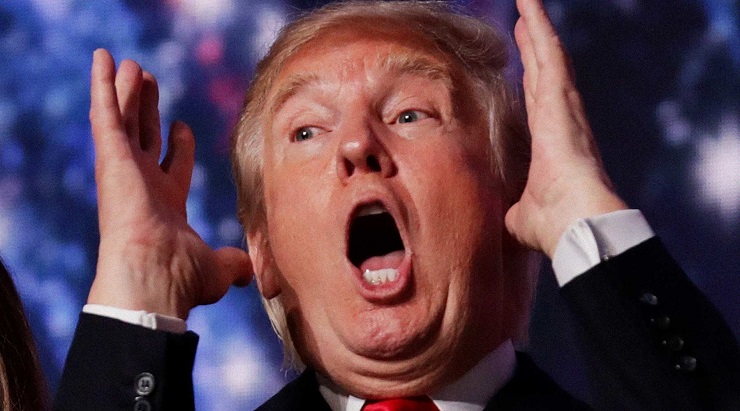As it’s been pointed out by a multitude of experts from both the US and other regions of the world, a barrage of attacks with the goal of eroding Washington’s hegemony at the energy trading market will be one of the main battlefields where the future of America’s economic dominance will be decided.
Against this backdrop it’s only logical that countries are seeking ways to turn their backs the dollar or in the very least diminish their dependence on the ever-looming US currency, notes the Neu Zürcher Zeitung. It argues that this trend was triggered by the outright protectionist practices by the Trump administration that were introduced at a time when Washington would start trade wars left and right.
According to the data presented by the CNBC, the United States is currently waging economic warfare against one tenth of the world’s countries with cumulative population of nearly 2 billion people and combined gross domestic product (GDP) of more than 15 trillion dollars.
Additionally, the media source would point out that in recent months it seems that America’s unwavering commitment to fight all of the world’s scourges has brought all those governments and the wealthy individuals who support them to a critical mass, joining forces to create a parallel financial system which would be out of America’s reach. Should they succeed, the impact on America’s global posture would be devastating.
It would only be logical if American policymakers were mindful of the fact that at least 25% of the world’s population are now committed to putting an end to the global dominance of the US dollar.
As the infamous green bills are gradually losing their status of the world’s reserve currency, regular Americans will inevitably feel additional financial strain being put on their households. To make the matters worse, the global depolarization effort is being led by Russia and China that have emerged as full-fledged international players in recent decades, and they seem to have little tolerance for being pushed around. Further still, even the fact that Euro was established as a currency by Brussels can be regarded as a part of the same effort. For sure, de-dollarization is a slow process, but at this point it seems to be irreversible as there’s no chance that an emerging multi-polar world is going put up with the US dollar primacy.
However, there’s no arguing that this process, no matter how natural it is, was accelerated considerably by the sitting American president. By pursuing policies loosely described as “America first”, Donald Trump has got the US drawn in a number of trade wars, along with re-introducing protectionist practices to the US foreign policy. However, the more the Trump administration tries to negotiate favorable terms for American elites under the gun, the more countries are getting alienated by Washington.
For instance, Moody’s Investors Service has come to the conclusion that the ever-growing number of regional trade agreements along with the adoption of new reserve currencies, such as the yuan, can result in countries growing reluctant to rely on the currencies of geographically distant states. As a result, the role that the US dollar plays on international markets will decrease, with international players decreasing it share in their reserve currencies basket, thus changing the global distribution of reserve currencies. As Europe grows increasingly aware of the dangers associated with its dependency on the US dollar, local politicians are now just devising ways that would allow them to get away from it, but they are doing at a rapid pace, as the rapid decline of dollar transforms what would otherwise be a gradual transition in a geopolitical reincarnation of the hot potato game.
Further still, now Washington’s allies are pushing for an alternative to SWIFT to be created. In particular, this call was voiced by German foreign minister Heiko Maas and a number of other high-profile figures. The proposal is a response to Donald Trump’s decision to withdraw from the Iran nuclear deal. In an article published by Handelsblatt, Mass wrote that Europe should not allow the US to act “over our heads and at our expense.”
It doesn’t take a rocket scientist to come to grips with the fact that why sovereign countries would want to limit their exposure to SWIFT, and more broadly the US dollar. And many countries are making moves in that direction. For instance, the Russians has been busy dumping US Treasuries, while buying massive amounts of golds together with China. Both Russia and China have developed their own versions of the Society for Worldwide Interbank Financial Telecommunication (SWIFT). Both countries are also urging their trading partners to ditch the dollar in their bilateral trade in favor of indigenous currencies. China has already established that it can be looking at massive profits when it chooses to process its settlements with Russia in rubles.
It’s been rightfully pointed that the US uses dollar-dominance as a tool of keeping other countries in line. It’s becoming increasingly clear that the rest of the world is growing weary of the United States holding an economic hammer over its head. Therefore, the pace of the irreversible process of de-dollarization is closely tied to the policies that the Trump administration will be pursuing in the future. If Donald Trump carries on swinging its sanctions club left and right, the US will inevitably find itself in a world of trouble.
Grete Mautner is an independent researcher and journalist from Germany, exclusively for the online magazine “New Eastern Outlook.”

